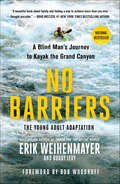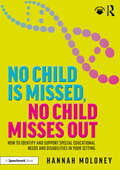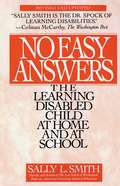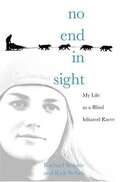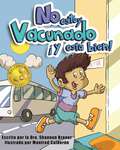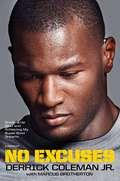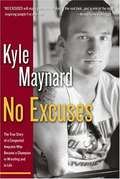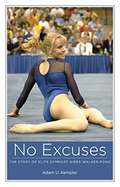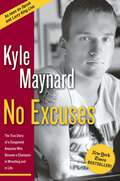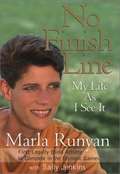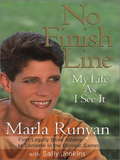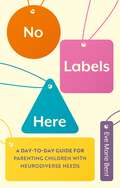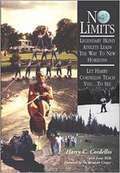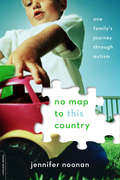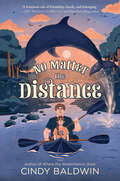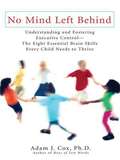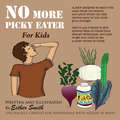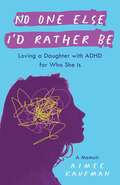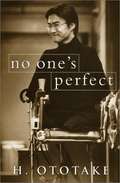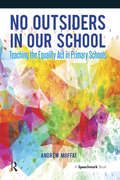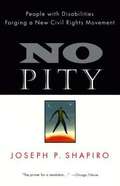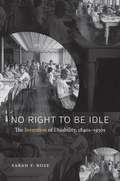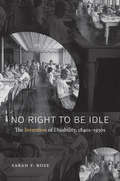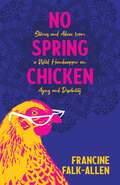- Table View
- List View
No Barriers: A Blind Man's Journey to Kayak the Grand Canyon: The Young Adult Adaptation
by Erik Weihenmayer Buddy Levy2018 Colorado Book Awards finalist in the Creative Nonfiction andNational Bestseller and Honorable Mention Award Winner in the Outdoor Literature category of the 2017 National Outdoor Book Awards (NOBA) — “A beautiful book about family and finding a way to achieve more than you ever thought possible.” —Brad Meltzer, New York Times bestselling authorErik Weihenmayer has a long history of turning obstacles into adventures. Born with a rare condition that blinded him as a teenager, he never let his diagnosis hold him back from a full life. As an athlete, explorer, speaker and activist, he has opened the eyes of people around the world to what's possible. In 2001, he became the first blind man to climb Mount Everest, the highest point on Earth. In 2005, he co-founded his nonprofit organization, No Barriers, to empower others to overcome adversity and achieve their biggest goals. This special edition of No Barriers introduces kids to the incredible true story of Erik's most terrifying journey: solo kayaking the thunderous whitewater of the Grand Canyon. Erik and his friends form a courageous crew to do battle with some of the harshest elements nature has to offer. Along the course of Erik's journey, he meets other trailblazers: adventurers, scientists, artists, and activists who show Erik the way forward and teach him the meaning of No Barriers—“What’s Within You is Stronger Than What’s in Your Way.”
No Child is Missed, No Child Misses Out: How to Identify and Support Special Educational Needs and Disabilities in Your Setting
by Hannah MoloneyThis book offers an evidence-based approach to empower early years, primary and secondary education professionals to identify individual pupil needs quickly and carefully, without the long wait or cost for a specialist diagnosis.The resource guides the reader through aspects of core cognitive testing, showing how to identify specific areas of need from phonological and visual processing to executive functioning and mental health. It advocates for child-centred and school-based solutions for “what now?” and “what next?”, based on screening data, and supports SEND teams to provide targeted strategies and advice for colleagues and families alike. At a strategic level, the book enables school leaders to use cohort data over time to anticipate trends and to develop and improve provision, policies, and practice, ensuring that no child misses out.With suggestions for quick, free, easy and timely assessments, this comprehensive resource is an invaluable tool for all SEND professionals working in or alongside mainstream and alternative provision at early years, primary or secondary level.
No Easy Answer: The Learning Disabled Child at Home and at School
by Sally SmithParents and teachers of learning disabled children have tumed to Sally Smith's No Easy Answers for information, advice, and comfort for more than fifteen years. In this revised, trade paperback edition of the latest information on learning disabilities in a clear, honest, and accessible way. This completely updated edition contains new chapters on Attention Deficit Disorder and Attention Deficit Hyperactivity Disorder, and on the public laws that guarantee an equal education for learning disabled children. There is also an entirely new section on learning disabled adults and the laws that protect them. Sally Smith, the parent of a learning disabled child herself, guides parents along every step of the way, from determining if their child is learning disabled to challenging the school system to provide special services. Drawing on more than twenty-five years of experience at her own nationally acclaimed school, she also offers valuable strategies to teachers who are anxious or discouraged as they struggle with learning disabled students. Although there are no easy answers, Sally Smith's experience, wealth of information, and sense of humor provide essential support.From the Trade Paperback edition.
No End In Sight: My Life as a Blind Iditarod Racer
by Rachael Scdoris Rick SteberRachael Scdoris, the daughter of a sled musher, has a passion for sled dogs and racing. From a young age she dreams of racing the Iditarod. Afflicted with a rare eye disorder, she is legally blind but is determined to overcome obstacles to make her dream come true. The book tells of her childhood, her experiences at school, and her struggle to become independent. Her love of dogs and dogsledding are paramount throughout her young life.
No Estoy Vacunado ¡Y Está Bien!
by Dr. Shannon KronerNo estoy vacunado y está bien es la historia de un niño no vacunado llamado Nicholas Novaks, quien comparte las muchas razones por las que sus padres han decidido no vacunarlo. Nicholas explica las preocupaciones personales de sus padres sobre las lesiones causadas por las vacunas, la importancia de encontrar un médico en quien confiar y con quien hablar abiertamente, la investigación que hicieron antes de tomar esta decisión, y cómo es la vida para un niño no vacunado que tiene un hermano mayor con lesiones causadas por la vacuna. Inspirado por las historias personales de niños con lesiones causadas por vacunas, que han sido compartidas con la Dra. Shannon Kroner a lo largo de muchos años de trabajo con familias con necesidades especiales, la Dra. Kroner tiene como objetivo crear conciencia sobre la importancia de elegir vacunar o no y la necesidad de investigar antes de tomar una decisión importante como la vacunación. Únete a Nicholas mientras comparte lo que significa ser un niño no vacunado en el mundo actual y por qué la elección personal en cuanto a la vacunación siempre debe ser respetada.
No Excuses
by Marcus Brotherton Derrick Coleman Jr.The first deaf athlete to play offense in the NFL (and win a Super Bowl with the Seattle Seahawks!) relates his inspirational story of hard work and determination in his own words. Great for readers of all ages.The inspirational memoir from the popular current Seattle Seahawks running back Derrick Coleman Jr., who, in just his second year in the NFL, won the 2014 Super Bowl with the Seahawks. Showcasing his unlikely and challenging journey to become the first deaf offensive NFL player, he talks about overcoming internal obstacles and external obstacles (bullies and naysayers) in the course of reaching your true potential.
No Excuses
by Kyle MaynardFrom the Book Jacket: He was born a congenital amputee, his arms ending at his elbows and his legs at his knees. But that didn't stop Kyle Maynard from becoming a champion, on the wrestling mat and in his life. KYLE MAYNARD was born in 1986 with a rare disorder called congenital amputation. He has no forearms, shortened legs, and stands only four feet tall. Yet Kyle has learned to live a full and active life. Besides dealing with everyday challenges, he is an excellent student, has impeccable handwriting, and can type fifty words a minute. A competitor to the core, Kyle was determined to succeed as an athlete. Through hard work, the support of his family, and a coach who designed new wrestling moves like the "jawbreaker" and "buzz saw," Kyle became one of the top high school wrestlers in the state of Georgia. In 2005, he broke the world record in the modified bench press by lifting 360 pounds, three times his body weight. Kyle is the 2004 ESPY Award Winner (Best Athlete with a Disability) and a recipient of the President's Award for the Sports Humanitarian Hall of Fame. He is currently a student at the University of Georgia.
No Excuses: The Story of Elite Gymnast Aimee Walker-pond
by Adam KemplerThis biography traces the gymnastics career of a girl - Aimee, born deaf and blind in one eye and describes how she overcame her health struggles, learned American Sign Language, succeeded in gymnastics, enjoyed social activities, acted in movies, traveled to Hawaii and Russia, worked hard in school, competed in college, and found romance. Bruno Grandi, President of the International Gymnastics Federation, said, “Aimee has filled our hearts with the fire of warmth and love and inspired us all to become better.” Valorie Kondos Field, head women’s gymnastics coach at UCLA and winner of six NCAA National Championships, said, “Aimee’s not deaf. She just can’t hear. Why would she need two eyes, when she has one? She has no excuses.”
No Excuses: The True Story of a Congenital Amputee Who Became a Champion in Wrestling And in Life
by Kyle MaynardHe was born a congenital amputee, his arms ending at his elbows and his legs at his knees. But that didn't stop Kyle Maynard from becoming a champion, on the wrestling mat and in his life.No Excuses is the inspiring story of Kyle's battle against the odds. You'll learn about the family who supported him, the coach who trained him, and the faith that strengthened him to face the toughest fights.
No Finish Line: My Life as I See It
by Sally Jenkins Marla RunyanMarla Runyan was nine years old when she was diagnosed with Stargardt's disease, an irreversible form of macular degeneration. With the uneasy but unwavering support of her parents, she refused to let their diagnosis limit her dreams. Despite her severely impaired, ever-worsening vision, Marla rode horseback and learned to play the violin. And she found her true calling in sports. A gifted and natural athlete, Marla began to compete in the unlikeliest event of all: the heptathlon, the grueling women's equivalent of the decathlon, consisting of seven events: the 200-meter dash, high jump, shot put, 100-meter hurdles, long jump, javelin throw, and 800-meter run. In 1996, she astonished the sports world by qualifying for the U.S. Olympic Trials, in which she broke the American record for the heptathlon 800. It was then that she decided to concentrate on her running. Four years of intense effort paid off: in 2000, she qualified for the U.S. Olympic team by finishing third in the 1500 meters. In Sydney, she placed eighth in the finals and was the top American finisher-the highest women's placing for the United States in the event's history. Not long after her return to the States, she shattered the American indoor record for the 5000 meters. With endearing self-deprecation and surprising wit, Marla reveals what it's like to see the world through her eyes, how it feels to grow up "disabled" in a society where expectations are often based on perceived abilities, and what it means to compete at the world-class level despite the fact that-quite literally, for her-there is no finish line.
No Finish Line: My Life as I See It
by Sally Jenkins Marla Runyan"Blind? I think there's no doubt that Marla Runyan can see things much clearer than most of us with 20/20 vision. " - Lance Armstrong <P> Marla Runyan was nine years old when she was diagnosed with Stargardt's disease, an irreversible form of macular degeneration. With the uneasy but unwavering support of her parents, she refused to let her diagnosis limit her dreams. Despite her severely impaired, ever-worsening vision, Marla rode horseback and learned to play the violin. And she found her true calling in sports. A gifted and natural athlete, Marla began to compete in the unlikeliest event of all: the heptathlon, the grueling women's equivalent of the decathlon, consisting of seven events: the 200-meter dash, high jump, shot put, 100-meter hurdles, long jump, javelin throw, and 800-meter run. In 1996, she astonished the sports world by qualifying for the U. S. Olympic Trials and, along the way, set the American record for heptathlon 800. It was then that she decided to concentrate on her running. Four years of intense effort paid off. In 2000, she qualified for the U. S. Olympic team by finishing third in the 1,500 meters. In Sydney, she placed eighth in the finals, the top American finisher - the highest women's placing for the United States in the event's history. With self-deprecation and surprising wit, Marla reveals what it's like to see the world through her eyes, how it feels to grow up "disabled" in a society where expectations are often based on perceived abilities, and what it means to compete at the world-class level despite the fact that - quite literally, for her - there is no finish line.
No Labels Here: A Day-to-day Guide for Parenting Children with Neurodiverse Needs
by Eve BentEve Bent has been where you are now. She knows how it feels to work your way through the seemingly endless pre-diagnosis period, while trying to access the right financial, medical and educational support for your child. This is a journey that can feel long and immensely challenging, but Eve's here to tell you that you're not alone.Whether you are at the beginning, middle or end of your pre-diagnosis journey, this book will provide advice around how to deal with the practical challenges that come from parenting kids who are developing differently. It also an opportunity to reflect on the fun and the humour in busy family life, and learn from someone else who has done it before and made it through.From the early morning starts to the late-night bedtimes, food aversions, sensory needs and visiting new places, this dip-in/dip-out guide gives you the advice you've always needed, straight from one parent to another.
No Limits: Harry Cordellos, America's Legendary Blind Athlete
by Harry C. Cordellos Janet WellsImagine a blind person water-skiing, golfing, running a marathon, and even diving. Harry Cordello did not let his blindness limit his activity. Instead he asked himself "Why not"?
No Map To This Country: One Family's Journey Through Autism
by Jennifer NoonanA heartbreaking yet also funny and ultimately empowering memoir revealing the a multi-year journey into the latest science and treatments in order to rescue her kids and her family from autism.
No Matter the Distance
by Cindy BaldwinAn unexpected animal companion helps a girl with cystic fibrosis learn to write her own story in this captivating novel in verse by award-winning author and disabled activist Cindy Baldwin. Penny Rooney has cystic fibrosis, which means she has to do breathing treatments to help her lungs work. Some days, it seems like her CF is the only thing Penny knows about herself for sure.From her point of view, everyone around her can make sense of their place in the world. So why can’t Penny even begin to write a poem about herself for school?Then during spring break Penny spots something impossible in the creek behind her house: a dolphin, far from its home. Penny names the dolphin Rose and feels an immediate bond, since the dolphin is also sick.But as Penny’s CF worsens, she realizes that Rose needs to return to her pod to get better. Will Penny be able to help guide Rose back to the ocean, even if it means losing her friend?This heartwarming story, which marks the first time an author with cystic fibrosis is writing a protagonist with CF, will transport readers into a world full of friendship, family, and powerful self-discovery.
No Mind Left Behind
by Cox Adam J.From the cutting edge of brain science, eight crucial skills for children's future success-now in paperback. From a clinical psychologist who has devoted his clinical and research work to the study of executive control skills, here is a program for helping children master the eight essential cognitive skills that are critical for success in life in work:* Taking initiative * Screening out distractions* Organizing * Thinking flexibly* Planning * Regulating emotions* Self-monitoring * Using memory effectivelyUsing case studies and anecdotes, Dr. Cox presents a comprehensive and practical plan for parents. The book addresses special-needs children as well as neurotypical children, and includes practical suggestions for parents and educators.
No More Picky Eaters: Designed to teach kids what foods are healthy, and which foods can help your body grow stronger
by Esther SmithThe purpose of this book is to help get kids to not only e at a wider variety of foods... but to understand why they need to, and how it will help them feel better and function in a healthier manner. Certainly most parents have heard their child scream that the food is “yucky,” they want candy, “get this off my plate,” or even suggest that they might die if you make them eat it. No More Picky Eater will help your child to see some of the foods that are healthy for our bodies, and become familiar with them and what they look like, even at a young age. It will cover which parts of the body that some foods specifically target, and assist in their healthy function; as well as what could happen to them if they ate only their “favorite food,” even if it is a healthy choice. No More Pick Eater goes into some of the simple or beginning steps of Food Therapy. While Esther is not a food therapist she has been through Food Therapy and other specialized parent trainings, and has observed many of her children while they were working with food therapists. “These things were taught to me in Oregon by specialists,” says Smith. “And as ‘crazy' as some of them seemed to me... I followed their advice and it helped. It wasn't overnight, but through persistence, and trying their suggestions over and over (daily)... it finally worked and they began eating and getting over their food sensitivities, phobias and issues.”
No One Else I'd Rather Be
by Aimee KaufmanFor parents of a child with a disability, this is a memoir of overcoming criticism from friends, family, and therapists and learning to rely on one&’s own instincts—and boundless love—to successfully raise a child with ADHD.Thank you for always loving me, Aimee Kaufman&’s daughter, Sam, wrote in a Mother&’s Day card at twenty-two years old. Reading those words, Aimee knew she&’d been right to follow her heart throughout her younger daughter&’s tumultuous childhood. Aimee spent many years doubting herself and fielding hurtful criticism about the way she was raising her daughter. But through it all, she consistently held to the belief that whatever tools and tricks she and Sam picked up from her own copious research and the experts she sought out to help her daughter, the true key to Sam&’s happiness and success was unconditional love. In the end, the strong bond she cultivated with her daughter is what allowed them both to survive all the ups and downs—and, eventually, get Sam through school and into a career where she could thrive. Heartfelt but clear-eyed, No One Else I&’d Rather Be is an encouraging resource for parents looking to feel more confidence in the decisions they make regarding their child with a disability—and a testament to the power of a parent&’s unconditional love.
No One's Perfect
by Hirotada Ototake Gerry HarcourtMemoir of a young Japanese man born with no arms or legs.
No Outsiders in Our School: Teaching the Equality Act in Primary Schools
by Andrew MoffatThis brand new resource provides much needed support for every primary school in the delivery of the objectives outlined in the Equality Act 2010; and in the provision of personal, social, health and economic education (PSHE) for every child. This resource provides teachers with a curriculum that promotes equality for all sections of the community. But more than that, the resource aims to bring children and parents on board from the start so that children leave primary school happy and excited about living in a community full of difference and diversity, whether that difference is through ethnicity, gender, ability, sexual orientation, gender identity, age or religion. The resource includes 5 lesson plans for every primary school year group (EYFS- Y6) based upon a selection of 35 picture books. Issues addressed include: gender and gender identity, religion, sexual orientation, disability and age. There is an introductory chapter explaining the legal framework behind the resource, quoting Ofsted and the DfE. A second chapter focuses on creating the whole school ethos through assemblies, school displays and after school clubs. A third chapter focuses on engaging parents. Age 7+ Format 96pp, paperback (245 x 171mm) Andrew has been a full time teacher for 20 years and is currently the Assistant Head Teacher in a large primary school in inner city Birmingham.
No Pity: People with Disabilities Forging a New Civil Rights Movement
by Joseph P. ShapiroPeople with disabilities forging the newest and last human rights movement of the century.
No Right To Be Idle: The Invention Of Disability, 1850-1930
by Sarah F. Rose<P><P>During the late nineteenth and early twentieth centuries, Americans with all sorts of disabilities came to be labeled as "unproductive citizens." Before that, disabled people had contributed as they were able in homes, on farms, and in the wage labor market, reflecting the fact that Americans had long viewed productivity as a spectrum that varied by age, gender, and ability. But as Sarah F. Rose explains in No Right to Be Idle, a perfect storm of public policies, shifting family structures, and economic changes effectively barred workers with disabilities from mainstream workplaces and simultaneously cast disabled people as morally questionable dependents in need of permanent rehabilitation to achieve "self-care" and "self-support." <P><P> By tracing the experiences of policymakers, employers, reformers, and disabled people caught up in this epochal transition, Rose masterfully integrates disability history and labor history. She shows how people with disabilities lost access to paid work and the status of "worker--a shift that relegated them and their families to poverty and second-class economic and social citizenship. This has vast consequences for debates about disability, work, poverty, and welfare in the century to come.
No Right to Be Idle: The Invention of Disability, 1840s–1930s
by Sarah F. RoseDuring the late nineteenth and early twentieth centuries, Americans with all sorts of disabilities came to be labeled as "unproductive citizens." Before that, disabled people had contributed as they were able in homes, on farms, and in the wage labor market, reflecting the fact that Americans had long viewed productivity as a spectrum that varied by age, gender, and ability. But as Sarah F. Rose explains in No Right to Be Idle, a perfect storm of public policies, shifting family structures, and economic changes effectively barred workers with disabilities from mainstream workplaces and simultaneously cast disabled people as morally questionable dependents in need of permanent rehabilitation to achieve "self-care" and "self-support." By tracing the experiences of policymakers, employers, reformers, and disabled people caught up in this epochal transition, Rose masterfully integrates disability history and labor history. She shows how people with disabilities lost access to paid work and the status of "worker--a shift that relegated them and their families to poverty and second-class economic and social citizenship. This has vast consequences for debates about disability, work, poverty, and welfare in the century to come.
No Sight - Great Vision: A Centenary History of the Association for the Blind
by J. W. WilsonThis text provides a history of the Association for the Blind in Australia.
No Spring Chicken: Stories and Advice from a Wild Handicapper on Aging and Disability
by Francine Falk-Allen2022 Foreword Indies Finalist in TravelAs we age, we all begin to have physical difficulties to contend with.In No Spring Chicken, Francine Falk-Allen—a polio survivor who knows a thing or two about living with a disability—offers her own take on how to navigate the complications aging brings with equanimity (and a sense of humor). The handbook is divided into three sections: Part I is a jaunt through accessible travel pleasures and pitfalls in several parts of the world; Part II addresses the adaptation people who love a handicapped or aging person could make in order to have a lighter, more mutually rewarding relationship with him or her, as well as advice for physically challenged and aging persons themselves regarding self-care, exercise, pain management, healthcare, and more; and Part III discusses the challenges, rewards and logistics of engaging with groups of people who share similar issues. Accessible and wryly funny, No Spring Chicken is a fun and informative guide to living your best and longest life—whatever your physical challenges, and whatever your age.
